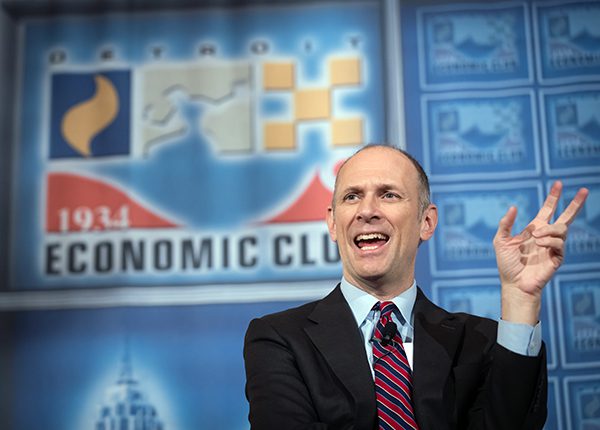
Austan Goolsbee knows his economic history, and he shared a little of it with the crowd that turned out for an economic event Tuesday.
During a discussion on the national inflation rate, Goolsbee – the president and CEO of the Federal Reserve Bank of Chicago – told the audience at a DEC meeting about what he called one of the worst economic times in U.S. history, with an inflation rate that, despite an 11% unemployment rate, was taken down by 4% in one of the country’s worst recessions.
To date, Goolsbee pointed out, it’s the biggest one-year drop in inflation ever. But maybe not for long.
Goolsbee, who took over as head of the Chicago Fed in January, said the current rate of inflation – the government tagged it at 3.2% for October – could represent an even larger drop, a nearly 6% fall from its peak of 9.1% in June 2022. And it has happened, he pointed out, without an accompanying huge recession.
“If you have to get inflation down a lot, they can (usually) only do it with a great deal of pain,” Goolsbee said Tuesday. “In 2023, we may surpass the biggest drop in inflation in 100 years, and unlike 1982, the unemployment rate hasn’t even gotten to 4%. We will have gotten inflation down perhaps more than any other year in a century without having a recession.
“That’s what I call the ‘golden path,’” he added. “That’s more than a soft landing, it’s the softest of all soft landings.”
Goolsbee acknowledged that, from an economic standpoint, 2023 has been a better year than many had hoped as the Fed aggressively raised interest rates. The U.S. economy, Goolsbee said, has avoided a recession, even though many thought that wouldn’t be the case as the Fed fought inflation by raising interest rates 11 times since March 2022.
He attributed the economy’s strength to fixes in supply chain woes that were triggered during the COVID-19 pandemic, improvements in productivity and an overall confidence by many that the Fed was serious about getting the job done and bringing inflation down.
The pain, he said, has been focused in certain areas, such as homeownership. It’s less affordable, for example, for many to buy a new house because higher interest rates are driving up monthly payments. Goolsbee said he will be watching housing inflation in the coming months to see what progress is being made.
Goolsbee pointed out the prevailing wisdom headed into 2023 was the U.S. would suffer a significant recession. It hasn’t happened, he said, because supply chain issues that plagued the country through the pandemic have largely been addressed and productivity is up.
“We’ve had strong productivity growth, which is like the magic beanstalk beans for the economy,” Goolsbee said. “If you have productivity growth, you can have faster wage growth, faster GDP … unlike previous episodes of inflation, the expectation in the marketplace of where inflation will be one year, five years, 10 years from now, those expectations did not go up, even as inflation got to 9%. That is a testament to the credibility of the Fed itself.”
There’s still a disconnect between the economic data, Goolsbee said, and people’s feelings about the economy.
“You feel that from individuals, where the answer to the question ‘How is the economy? Horrible.’ ‘How are your finances? Actually quite good,’” he said. “There’s never been a bigger gap at the individual level, but it’s also true of business. We’ve got GDP growth of almost 5% growth, which is more than double the trend growth rate. It’s literally not sustainable, that booming number … we talk to business people all the time. Nobody that we talk to was like, ‘wow!’ Five percent is booming, but that’s not what business was describing.”
While 2023 numbers weren’t as dire as many had expected, the outlook for 2024 isn’t for great numbers, either. Many economists don’t see a recession coming, according to a report from Bloomberg.
“We’re likely to dodge a recession in the year ahead,” said Bill Adams, chief economist at Comerica Bank in Dallas, according to Bloomberg.







